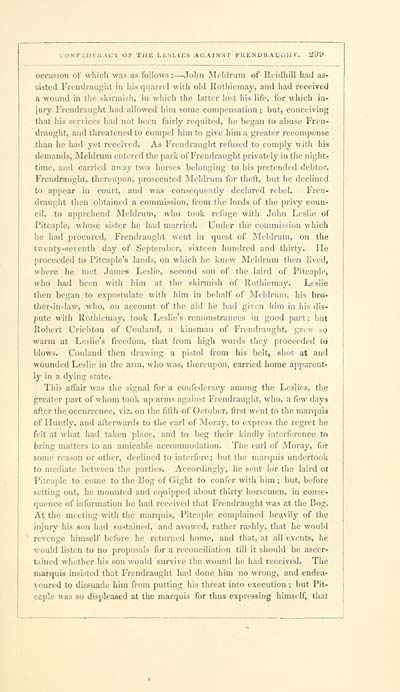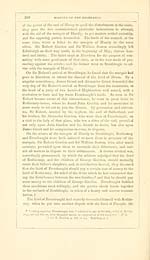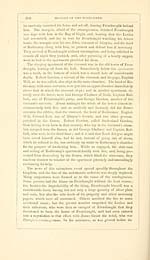Download files
Complete book:
Individual page:
Thumbnail gallery: Grid view | List view

LO.S'F[;UKKACli OF THE LESLIES AUAINST FKENDBAUGHC. 295)
occiision of which was as follows: — John Meklrura of IloidhiU had as-
Disted Frendraugiit in his qiiaritl with old Ilothieinaj', and had received
a wound in the skirmish, in which the latter lost his life, for which in-
jury Frendraught had allowed him some compensation; but, conceiving
that his services had not been fairly requited, he began to abuse Fren-
draught, and threatened to compel him to give him a greater recompense
than ho had yet received. As Frendraught refused to comply with his
demantls, JMeldruni entered the park of Frendraught privately in the night-
time, and carried away two horses belonging to his pretended debtor.
Frendraught, thereupon, prosecuted Meldrum for theft, but he declined
to appear in court, and was consequently declared rebel. Fren-
draught then obtained a commission, from the lords of the privj' coun-
cil, to apprehend Meldrum, who took refuge with John Leslie of
Pitcaple, whoso sister he had married. Under the commission which
he had procured, Frendraught went in quest of Blehlrum, on the
Iv.'enty-seventh day of September, sixteen hundred and thirty. He
proceeded to Pitcaple's lands, on which he knew Meldrum then lived,
where he met .James Leslie, second son of the laird of Pitcaple,
who had been with him at the skirmish of Rothiemay. Leslie
then began to expostulate with him in behalf of Meldrum, his bro-
ther-in-law, who, on account of the aid he had gi\"cn him in his dis-
pute with Rothiemay, took Leslie's remonstrances in good part; but
Robert Crichton of Couland, a kinsman of Frendraught, grew so
warm at Leslie's freedom, that from high words they proceeded to
blows. Couland then drawing a pistol from his belt, shot at and
wounded Leslie in the arm, who was, thereupon, carried home apparent-
ly in a dying state.
This affair was the signal for a confederacy among the Leslies, the
greater part of whom took up arms against Frendraught, who, a few days
after the occurrence, viz. on the fifth of October, first went to the marquis
of Huntly, and afterwards to the earl of Moray, to express the regret he
felt at what had taken place, and to beg their kindly interference to
bring matters to an amicable accommodation. The earl of iMoray, for
some reason or other, declined to interfere; but the marquis undertook
to mediate between the parties. Accordingl}', he sent for the laird ot
Pitcaple to come to the Bog of Gight to confer with him ; but, before
setting out, he mounted and equipped about thirty horsemen, in conse-
quence of information he had received that Frendraught was at the Bog.
At the meeting with the marquis, Pitcaple complained heavily of the
injury his son had sustained, and avowed, rather rashly, that he would
revenge himself before he returned home, and that, at all events, he
would listen to no proposals for a reconciliation till it should be ascer-
tiiined whether his son would survive the wound he had received. The
marquis insisted that Frendraught had done him no wrong, and endea-
\oured to dissuade him from putting his threat into execution ; but Pit-
caple was so displeased at the marquis for thus expressing himsi.'lf, tliat
occiision of which was as follows: — John Meklrura of IloidhiU had as-
Disted Frendraugiit in his qiiaritl with old Ilothieinaj', and had received
a wound in the skirmish, in which the latter lost his life, for which in-
jury Frendraught had allowed him some compensation; but, conceiving
that his services had not been fairly requited, he began to abuse Fren-
draught, and threatened to compel him to give him a greater recompense
than ho had yet received. As Frendraught refused to comply with his
demantls, JMeldruni entered the park of Frendraught privately in the night-
time, and carried away two horses belonging to his pretended debtor.
Frendraught, thereupon, prosecuted Meldrum for theft, but he declined
to appear in court, and was consequently declared rebel. Fren-
draught then obtained a commission, from the lords of the privj' coun-
cil, to apprehend Meldrum, who took refuge with John Leslie of
Pitcaple, whoso sister he had married. Under the commission which
he had procured, Frendraught went in quest of Blehlrum, on the
Iv.'enty-seventh day of September, sixteen hundred and thirty. He
proceeded to Pitcaple's lands, on which he knew Meldrum then lived,
where he met .James Leslie, second son of the laird of Pitcaple,
who had been with him at the skirmish of Rothiemay. Leslie
then began to expostulate with him in behalf of Meldrum, his bro-
ther-in-law, who, on account of the aid he had gi\"cn him in his dis-
pute with Rothiemay, took Leslie's remonstrances in good part; but
Robert Crichton of Couland, a kinsman of Frendraught, grew so
warm at Leslie's freedom, that from high words they proceeded to
blows. Couland then drawing a pistol from his belt, shot at and
wounded Leslie in the arm, who was, thereupon, carried home apparent-
ly in a dying state.
This affair was the signal for a confederacy among the Leslies, the
greater part of whom took up arms against Frendraught, who, a few days
after the occurrence, viz. on the fifth of October, first went to the marquis
of Huntly, and afterwards to the earl of Moray, to express the regret he
felt at what had taken place, and to beg their kindly interference to
bring matters to an amicable accommodation. The earl of iMoray, for
some reason or other, declined to interfere; but the marquis undertook
to mediate between the parties. Accordingl}', he sent for the laird ot
Pitcaple to come to the Bog of Gight to confer with him ; but, before
setting out, he mounted and equipped about thirty horsemen, in conse-
quence of information he had received that Frendraught was at the Bog.
At the meeting with the marquis, Pitcaple complained heavily of the
injury his son had sustained, and avowed, rather rashly, that he would
revenge himself before he returned home, and that, at all events, he
would listen to no proposals for a reconciliation till it should be ascer-
tiiined whether his son would survive the wound he had received. The
marquis insisted that Frendraught had done him no wrong, and endea-
\oured to dissuade him from putting his threat into execution ; but Pit-
caple was so displeased at the marquis for thus expressing himsi.'lf, tliat
Set display mode to: Large image | Transcription
Images and transcriptions on this page, including medium image downloads, may be used under the Creative Commons Attribution 4.0 International Licence unless otherwise stated. ![]()
| Early Gaelic Book Collections > Ossian Collection > History of the Highlands and of the Highland clans > Volume 1 > (413) |
|---|
| Permanent URL | https://digital.nls.uk/79677553 |
|---|
| Description | Vol. I. |
|---|---|
| Shelfmark | Oss.247 |
| Additional NLS resources: | |
| Attribution and copyright: |
|
| Description | Selected books from the Ossian Collection of 327 volumes, originally assembled by J. Norman Methven of Perth. Different editions and translations of James MacPherson's epic poem 'Ossian', some with a map of the 'Kingdom of Connor'. Also secondary material relating to Ossianic poetry and the Ossian controversy. |
|---|
| Description | Selected items from five 'Special and Named Printed Collections'. Includes books in Gaelic and other Celtic languages, works about the Gaels, their languages, literature, culture and history. |
|---|

